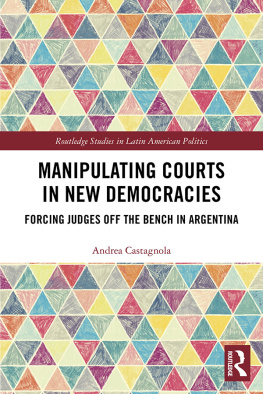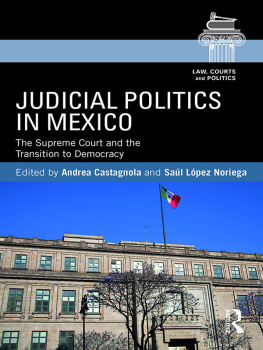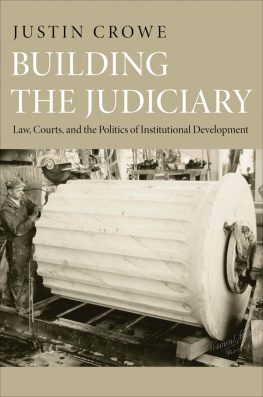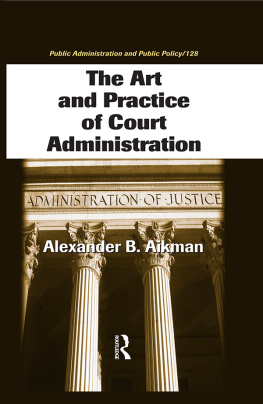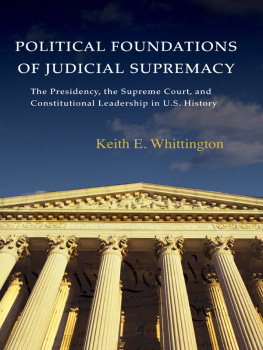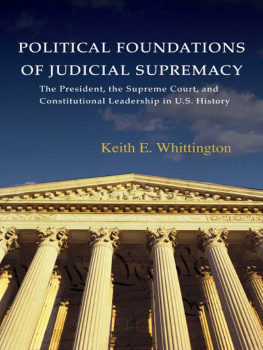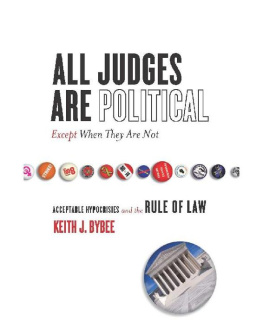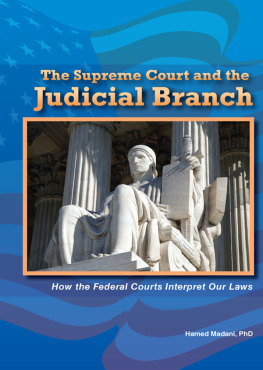Manipulating Courts in New Democracies
When can the Executive manipulate the composition of a Court? What political factors explain judicial instability on the bench?
Using original field data from Argentinas National Supreme Court and all 24 Provincial Supreme Courts, Andrea Castagnola develops a novel theory to explain forced retirements of judges. She argues that in developing democracies the political benefits of manipulating the court outweigh the costs associated with doing so. The instability of the political context and its institutions causes politicians to focus primarily on short-term goals and to care mostly about winning elections. Consequently, judiciaries become a valuable tool for politicians to have under their control.
Contrary to the predictions of strategic retirement theory, Castagnola demonstrates that there are various institutional and non-institutional mechanisms for induced retirement which politicians have used against justices, regardless of the amount of support their party has in Congress. The theoretical innovations contained herein shed much needed light on the existing literature on judicial politics and democratization. Even though the political manipulation of courts is a worldwide phenomenon, previous studies have shown that Argentina is the theory-generating case for studying manipulation of high courts.
Andrea Castagnola is an assistant professor at the School of Politics and Government at Universidad Nacional de San Martin, Argentina. She was assistant professor at Flacso-Mexico and holds a Post-Doc from the University of Bergen, Norway. Her research focuses on judicial politics in Latin America and Comparative Politics. Her work has been published in journals such as British Journal of Political Science, Journal of Politics, Journal of Politics in Latin America and Poltica y Gobierno.
Routledge Studies in Latin American Politics
Transforming Brazil
A History of National Development in the Postwar Era
Rafael R. Ioris
Pharmaceutical Autonomy and Public Health in Latin America
State, Society, and Industry in Brazils AIDS Program
Matthew Flynn
Civil-Military Relations in Post-Conflict Societies
Transforming the Role of the Military in Central America
Orlando J. Prez
Re-Imagining Community and Civil Society
In Latin America and the Caribbean
Edited by Gordana Yovanovich and Roberta Rice
Revolutionary Violence and the New Left
Transnational Perspectives
Edited by Alberto Martn lvarez and Eduardo Rey Tristn
Business-State Relations in Brazil
Challenges of the Port Reform Lobby
Mahrukh Doctor
The Politics of Capitalist Transformation
Brazilian Informatics Policy, Regime Change, and State Autonomy
Jeff Seward
Negotiating Trade Liberalization in Argentina and Chile
When Policy creates Politics
Andrea C. Bianculli
Understanding Cuba as a Nation
From European Settlement to Global Revolutionary Mission
Rafael E. Tarrag
Challenging the U.S.-Led War on Drugs
Argentina in Comparative Perspective
Sebastin Antonino Cutrona
Manipulating Courts in New Democracies
Forcing Judges off the Bench in Argentina
Andrea Castagnola
Crime, Violence and Security in the Caribbean
M. Raymond Izarali
First published 2018
by Routledge
711 Third Avenue, New York, NY 10017
and by Routledge
2 Park Square, Milton Park, Abingdon, Oxon, OX14 4RN
Routledge is an imprint of the Taylor & Francis Group, an informa business
2018 Taylor & Francis
The right of Andrea Castagnola to be identified as author of this work has been asserted by her in accordance with sections 77 and 78 of the Copyright, Designs and Patents Act 1988.
All rights reserved. No part of this book may be reprinted or reproduced or utilized in any form or by any electronic, mechanical, or other means, now known or hereafter invented, including photocopying and recording, or in any information storage or retrieval system, without permission in writing from the publishers.
Trademark notice: Product or corporate names may be trademarks or registered trademarks, and are used only for identification and explanation without intent to infringe.
Library of Congress Cataloging in Publication Data
Names: Castagnola, Andrea, author.
Title: Manipulating courts in new democracies : forcing judges off the bench in Argentina / Andrea Castagnola.
Description: New York : Routledge, 2017. | Includes bibliographical references and index.
Identifiers: LCCN 2017027137 (print) | LCCN 2017027590 (ebook) | ISBN 9781315271774 (Master) | ISBN 9781351986083 (WebPDF) | ISBN 9781351986076 (ePub) | ISBN 9781351986069 (Mobipocket/Kindle) | ISBN 9781138280724 (hardback : alk. paper)
Subjects: LCSH: Political questions and judicial powerArgentina. | Courts of last resortArgentina. | JudgesArgentina. | Justice, Administration ofArgentina. | DemocracyArgentina.
Classification: LCC KHA2533 (ebook) | LCC KHA2533 .C37 2017 (print) | DDC 347.82/035dc23
LC record available at https://lccn.loc.gov/2017027137
ISBN: 978-1-138-28072-4 (hbk)
ISBN: 978-1-315-27177-4 (ebk)
Typeset in Times New Roman
by Wearset Ltd, Boldon, Tyne and Wear
To Viole and Emma
Castagnolas book analyzes the systematic use of a subtle instrument to change the composition of courts. She studies a mechanism for vacancy creation that depends on the drive of local executives rather than on the decisions of judges and that involves the use of informal pressures rather than institutional instruments. She superbly illustrates how weak executives use the instrument to build friendly courts and how in hegemonic party systems, executives use it to control factions. In a nutshell, the book introduces a new tool for the kit.
Catalina Smulovitz, Plenary Professor, Universidad Torcuato Di Tella
This book answers a key question: why and when do politicians force justices off the bench? The answer offered contributes to, but also challenges, our knowledge regarding courts and their political role in democratic polities. The book nicely specifies the institutional conditions under which politicians motivations prompt them to get their own court and supports the arguments with well-done and interesting quantitative and qualitative analyses on Argentinean Supreme and state courts over a long period of time. The book delves into the unchartered territory of the relationship between judges stability in office and their independence, a critical topic in todays troubled democracies.
Julio Ros-Figueroa, Associate Professor of Political Science, Centro de Investigacin y Docencia Econmicas
Introduction
During recent years, the front pages of the newspapers have recurrently denounced the lack of independence of the judiciaries by revealing corruption cases as well as political manipulation of the justices. In November 2004, President Lucio Gutierrez from Ecuador with support from the congress removed 27 justices (out of 31) from the Supreme Court and seven judges (out of nine) from the Constitutional Tribunal as the result of explicit accusations that the justices and judges were politically loyal to the former president. In April 2005, the judiciary was, once again, the target of political manipulation when Gutierrez purged both the Supreme Court and the Constitutional Tribunal as a way to mitigate the critics and the opposition to his government. The country remained for seven months without a Supreme Court and for ten months without a Constitutional Tribunal. In July 2007 the Ecuadorian President Rafael Correa carried out a controversial restructuring of the judiciary, in which the Supreme Court changed not only its name (to the National Court of Justice) but also the total number of justices (reduced from 31 to 21). That same year, the Constitutional Tribunal was once again purged, in this case as a result of political confrontations with the executive. In Argentina in 1990, President Carlos Menem increased the number of sitting justices of the Supreme Court from five to nine and appointed six new justices to the bench, since two of the sitting justices had stepped off because of excessive political manipulation. In 2003, the Argentine President Nstor Kirchner induced the departure of six justices: two of them were impeached, and the other four were forced to leave via threats of impeachment and moral coercion.

